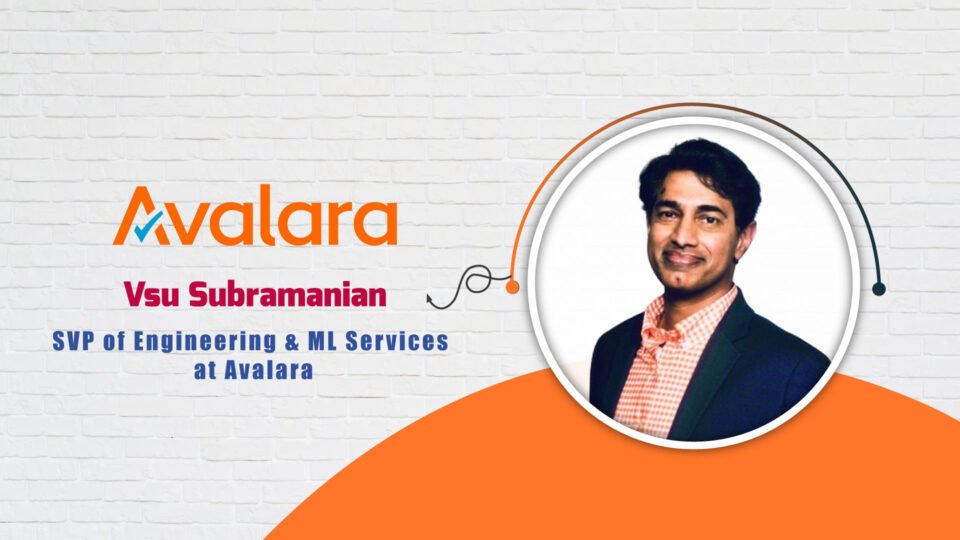Know how Avalara leverages AI and machine learning to enhance tax compliance and streamline operations.
Vsu, as the SVP of Content Engineering for Avalara, can you provide insights into how your role involves managing Avalara’s tax and compliance content database and driving the company’s use of AI and machine learning?
I lead the research and engineering teams that maintain and grow Avalara’s compliance content database, which powers our compliance products that make tax compliance easy and fast for our customers. I also drive the vision and use of artificial intelligence (AI) and machine learning (ML) across Avalara both for internal use and use in our products.
Given your experience in overseeing large-scale engineering programs at Optum and Thomson Reuters, how has that background influenced your practical approach to implementing AI, and what perspectives do you find refreshing for the audience?
Experimenting with AI versus implementing AI at-scale are quite different. Implementing AI requires the same operational sophistication needed to run any large software engineering solutions — they need to be resilient and be able to deal with unexpected situations. Implementing AI at-scale also requires high levels of monitorability and traceability. In scale implementations, the AI models must be supported by a solid engineering infrastructure, architecture, and overall operations.
Can you elaborate on Avalara’s sales tax plugin for ChatGPT? What specific use case can ChatGPT users solve with the plugin?
Avalara launched the first tax compliance plugin for ChatGPT that allows users to ask the platform to calculate and research general sales tax rates based on their location. We were also the first tax compliance software provider to work with OpenAI to use its protocol to build an integrated plugin for ChatGPT.
Businesses and consumers who have ChatGPT Plus accounts can install the Avalara plugin from ChatGPT’s plugin store. Once the plugin is installed, users can ask ChatGPT for general sales tax rates on the sale of tangible personal property by location or to calculate general sales tax on a specific sale by location. ChatGPT chooses when to use the plugin based on the question and conversation.
How does Avalara differentiate itself by applying AI and machine learning in a practical way that makes a significant business impact, as opposed to focusing on creating flashy new AI experiences?
At Avalara, we’re on a mission to make tax “less taxing, more relaxing” by automating the steps of the tax compliance process. We think about AI as a strategic tool to allow us to work better, smarter, and faster in pursuit of this mission.
We’re looking for places across our business and throughout the customer journey where AI can provide value around efficiency, simplicity, and more. For example, we use AI-powered tax classification tools to quickly and efficiently classify products or services to aid in sales tax taxability determinations and cross-border tariff determinations.
How has the integration of AI technologies allowed Avalara to streamline its processes and deliver better results? Are there specific examples or use cases that highlight the tangible benefits?
One step of the sales tax compliance journey for many businesses it to manage exempt sales, also known as exemption certificate management. Exemption certificates contain a lot of different information depending on the supplier, buyer, transaction details, and more. At Avalara, we process forms and notices and leverage AI to automatically extract information, which helps our customers manage and maintain exemption certificates more easily and effectively.
How do you balance the need for innovation with the practical application of AI to ensure it aligns with Avalara’s business goals and objectives?
We conduct regular hackathons to encourage innovation and experimentation within our engineering teams — many of which lead to new innovations for Avalara. When we find promising ideas, we do an ROI analysis and assess alignment with our strategic priorities before we invest in any of these ideas.
Can you share any challenges or lessons learned in applying AI in a tax automation context, and how has Avalara addressed these challenges to achieve successful outcomes?
At Avalara, we’re making sure that being quality-focused is a priority across the business. We know that AI is a capability that we can leverage, but it’s not a cure-all. That’s why we’ve been intentional about developing and releasing policies around AI to ensure that we are all following responsible AI guidelines and using it safely and efficiently across the business.
What strategies have you employed to foster a culture of innovation and collaboration within the research and engineering teams at Avalara?
We employ numerous strategies to ensure that we are fostering a culture of innovation and collaboration within Avalara Engineering. One key example is our use of hackathons, which allows members from across engineering and the company at-large to participate in the hackathon, We also set aside two weeks each quarter designated as an “innovation sprint,” which is time that our teams can spend focused on new innovation, learning and forward thinking planning.
We also make a range of trainings available to allow our teams to continue learning new skills and best practices as they emerge within the industry at-large.
In what ways do you see the landscape of tax automation evolving with the continued integration of AI and machine learning technologies? Are there emerging trends or developments that you find particularly noteworthy?
What we’re seeing right now is that more customers are starting to ask how AI will be used in compliance. I believe there is an expectation that gradually AI will help in assisting with the compliance journey. At a time where many people are leaving some compliance-related professions, we’re seeing a growing dearth in skill sets that create an opportunity for AI to help with many mundane manual tasks.
What areas do you see further opportunities for leveraging AI to enhance the company’s offerings and maintain a competitive edge in the tax automation software market?
Avalara was there at the beginning of the automation journey for tax. We have always been a pioneer in the tax space by being among the first to leverage the power of the best in technology, so AI will be no different. We are harnessing the power of AI to help us do what we do best already, in an effort to bring more scale and convenience to customers. We will continue to identify other areas within our products, customer experience, and internally where AI can help us deliver tax compliance automation to businesses with greater efficiency and speed at-scale.

Vsu Subramanian
SVP of Engineering & ML Services at Avalara
Vsu leads the research and engineering teams responsible for managing Avalara’s proprietary tax and compliance content database. He also drives the company’s use of AI and machine learning. He previously held senior leadership positions at Optum and Thomson Reuters overseeing large-scale engineering programs.

